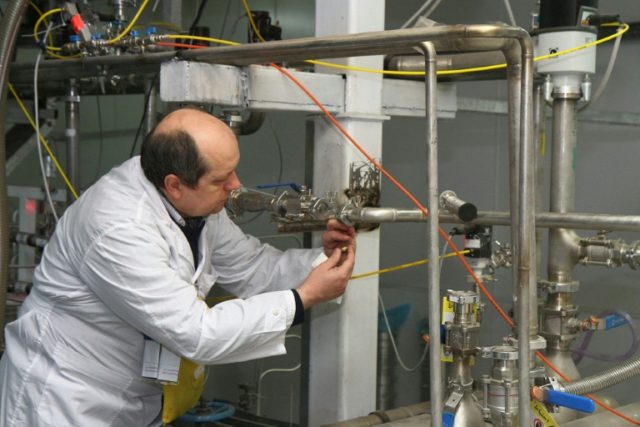Iran announced a major violation of the nuclear deal on Monday by surpassing its 3.67 percent enrichment limit for uranium and threatened to proceed to the dangerous 20 percent level, which would put Tehran only a small step away from producing weapons-grade nuclear material.
Atomic Energy Organization of Iran (AEOI) spokesman Behrouz Kamalvandi simultaneously portrayed the new enrichment step as something Iran suddenly noticed it needed to do to fuel its peacetime nuclear power plants and as the second step in Iran’s plan to intimidate Europe into rescuing it from U.S. sanctions, as quoted by Iran’s state-run Tasnim news agency:
The current level of uranium enrichment is fulfilling Iran’s demands for fuel necessary for running the reactors of nuclear power plants, Kamalvandi noted, adding that Tehran could easily produce 20-percent enriched fuel whenever it wants to.
As regards other plans that Iran could carry out in the third step to scale down its JCPOA undertakings, Kamalvandi pointed to the possible employment of IR-2 and IR-2M centrifuge machines or a rise in the number of active centrifuges.
“There are a lot of options for the next step in reducing the JCPOA commitments, but their implementation should be economically and technically feasible,” the spokesman added.
Kamalvandi also made it clear that the level of uranium enrichment in Iran has surpassed the 3.67 percent limit.
Kamalvandi said his organization is ready to execute an “upward trend in uranium enrichment” if ordered to do so by top officials in Tehran.
Iranian President Hassan Rouhani made it clear the new level of uranium enrichment was a warning to Europe and promised Iran has the capability to “increase it to any amount that we need.”
“If the remaining countries in the deal, especially the Europeans, do not fulfill their commitments seriously, and not do anything more than talk, Iran’s third step will be harder, more steadfast and somehow stunning,” promised Iranian Foreign Ministry spokesman Abbas Mousavi, referring to a new deadline Iran has set for European action on September 5.
The nuclear deal, formally known as the Joint Comprehensive Plan of Action (JCPOA), was supposed to eliminate Iran’s ability to enrich uranium beyond the three to four percent purity level needed for civilian nuclear power. Iran supposedly dismantled the thousands of advanced centrifuges necessary for performing higher levels of enrichment and altered its nuclear reactors so they could not produce weapons-grade material. Proponents of the deal gave assurances that Iran would need over a year to restore its ability to enrich uranium to near-weapons-grade levels.
Iranian Foreign Minister Mohammad Javad Zarif continued to push Tehran’s line that violating the nuclear deal is necessary to save it.
“Today, Iran is taking its second round of remedial steps under Para 36 of the JCPOA,” Zarif announced on Sunday.
“We reserve the right to continue to exercise legal remedies within JCPOA to protect our interests in the face of US economic terrorism. All such steps are reversible only through E3 compliance,” he insisted. E3 refers to the European participants in the nuclear deal.
Zarif argued the Europeans should “at minimum politically support Iran’s remedial measures” as an effort to “counter U.S. unilateralism.”
European and United Nations officials scrambled to minimize the severity of Iran’s transgressions on Monday. Former International Atomic Energy Agency (IAEA) inspector Robert Kelley told AFP that Iran’s move toward five percent uranium enrichment is “insignificant” and meant as a “poke in Trump’s eye.”
Another former IAEA official, Olli Heinonen, said Iran’s latest moves are “certainly not a matter of great concern” because they theoretically lack the capability to produce a large enough quantity of highly-enriched uranium to create a serious nuclear weapons threat. However, Iranian officials claim they can swiftly increase their production capacity by 400 percent or more.
The United Kingdom on Sunday warned Iran to “immediately stop and reverse all activities,” while Germany declared itself “extremely concerned” by Iran’s enrichment surge. The European Union is also “extremely concerned” and may call an emergency meeting this week to discuss Iran’s announcement.

COMMENTS
Please let us know if you're having issues with commenting.